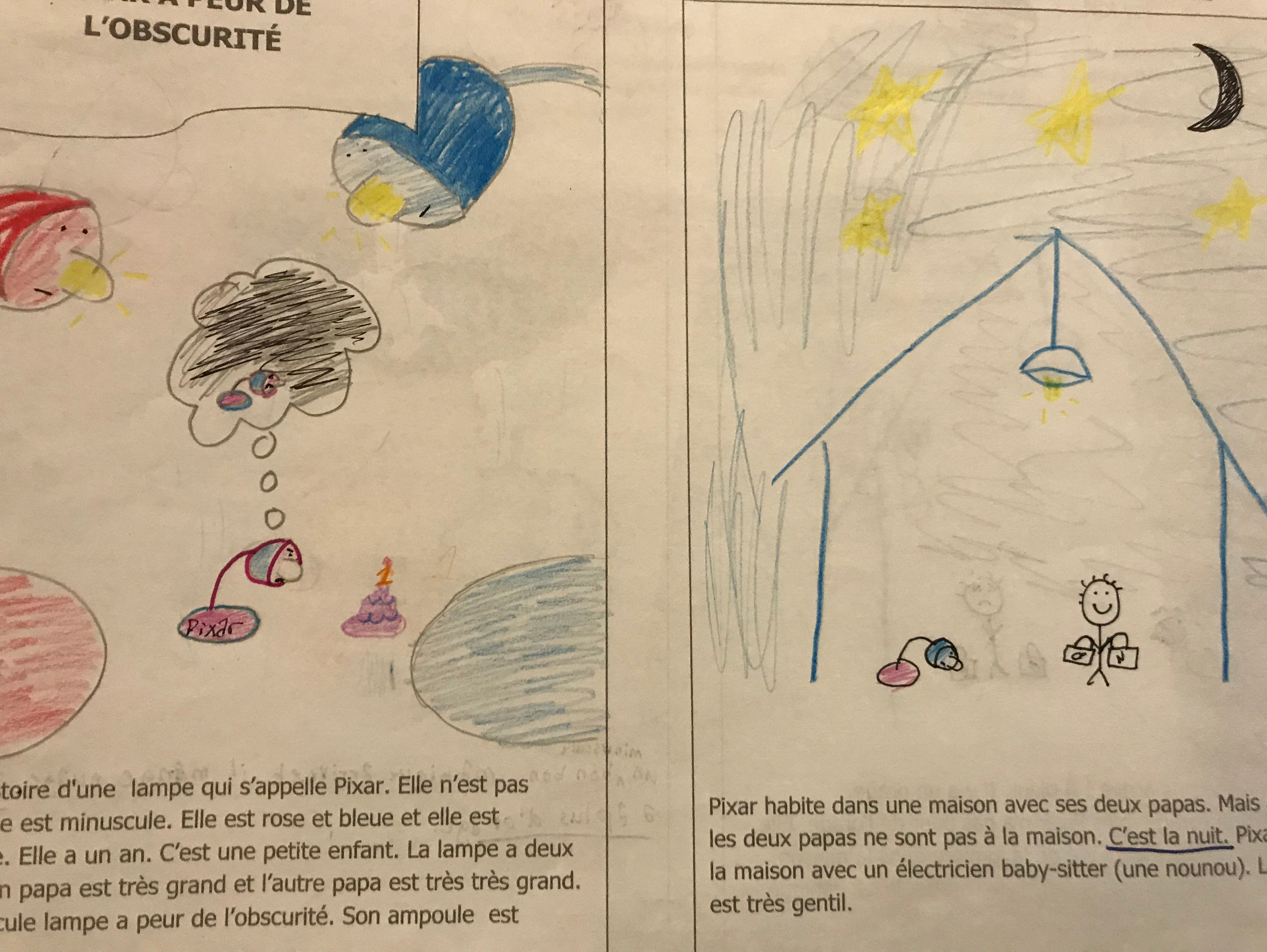This is the second installment in a series of posts about Assessments in the Communicative and Comprehension based classroom. This post covers my favorite assessments by communication mode.
1.My favorite interpretive assessments for Novice learners
- Listen and Draw or Read and Draw
- We create a One Word Image in class (orally). The next day, I bring the written description of the OWI, I read it out loud and students draw it. Or I give them the written description and they draw it.
- We create a story in class (orally). The next day, I bring the story in the form of a comic strip (template by Mike Peto)
- I tell a story in class using Story Listening supplementation. Then, we read the story together and I let them illustrate the story.
- I use this rubric (adapted from Claire Walter)
You can use Read and Draw for more and more complex (Novice) texts, as illustrated below:

Illustrating a One Word Image
PS: Notice the mistakes in this novice student’s speech bubbles? Let it go. I never asked for speech bubbles and she chose to take a risk and write. Yeah for her! She is conveying meaning with words in August already!

Illustrating a class-created story

Illustrating a story told in class using Story Listening supplementation
- Story retell
- Students listen to a story and write a retell in English
- Because writing a retell can take some time and I don’t like to spend that much time in English, I use this assessment when I am absent! I ask the sub to play an Alice Ayel story and my students write a retell in English. They are still listening to language in context while I am gone!
- I use a simple rubric:

- Main ideas from a short speech
- Students listen to a short speech (30-40 sec) and identify main ideas
- I select recordings from native speakers on audiolingua.com
- I provide some kind of graphic organizer for my Novice learners:

- I use a simple rubric:

2. My favorite interpersonal speaking and presentational writing assessments for Novice learners
I don’t have any! I spend most of my time providing my Novice students with as much input as possible. Do we talk in my class? Of course! Conversations occur naturally and spontaneously throughout the year through Personalized Questions & Answers, and all the Weekend / Calendar / Picture / Movie Talks. I am interested in developing a broad foundation, not making them experts at listing all the clothing one could possibly wear in a year. They will develop more expertise once they reach the Intermediate level.
So far this year, I have not formally assessed my Level 1 students in speaking and I have assessed my level 2 once (at semester exam). I do take time to formally assess production skills at semester exam, mainly because I want to show my students that one does not have to “practice speaking” to develop speaking skills. I want them to see how much they have grown. And I want data to show parents and admins if needed. Here is what I did for my Level 2 for the midterm exam:
- an Integrated Performance Assessment LITE VERSION
- Students listened to Lilly (60 sec) talk about her week and identified the main ideas
- Students read the transcript and answered some “meaning from context” and “comprehension” questions
- I gave them Lilly’s weekly schedule
- Students used her schedule to compare and contrast their week with Lilly’s week
If you are interested in seeing the assessment please email me at cecileflaine at gmail.
Please note, we did not spend time practicing these “skills” in class. It was interesting to see my students doing pretty well on this assessment without any major practice, simply because they had acquired enough language to be able to listen, read, and relate to someone’s life.
Coming out of this semester assessment, I conferenced with my students one on one and had a conversation about how they are doing with their “language skills”. They also self assessed their work ethic (not for a grade!) which sparked a productive conversation about behavior.

Read the third installment in this series on Assessments in the Communicative and Comprehension based classroom: Timed Writes as a way to measure growth.



Leave a Reply to wl@lrhsCancel reply